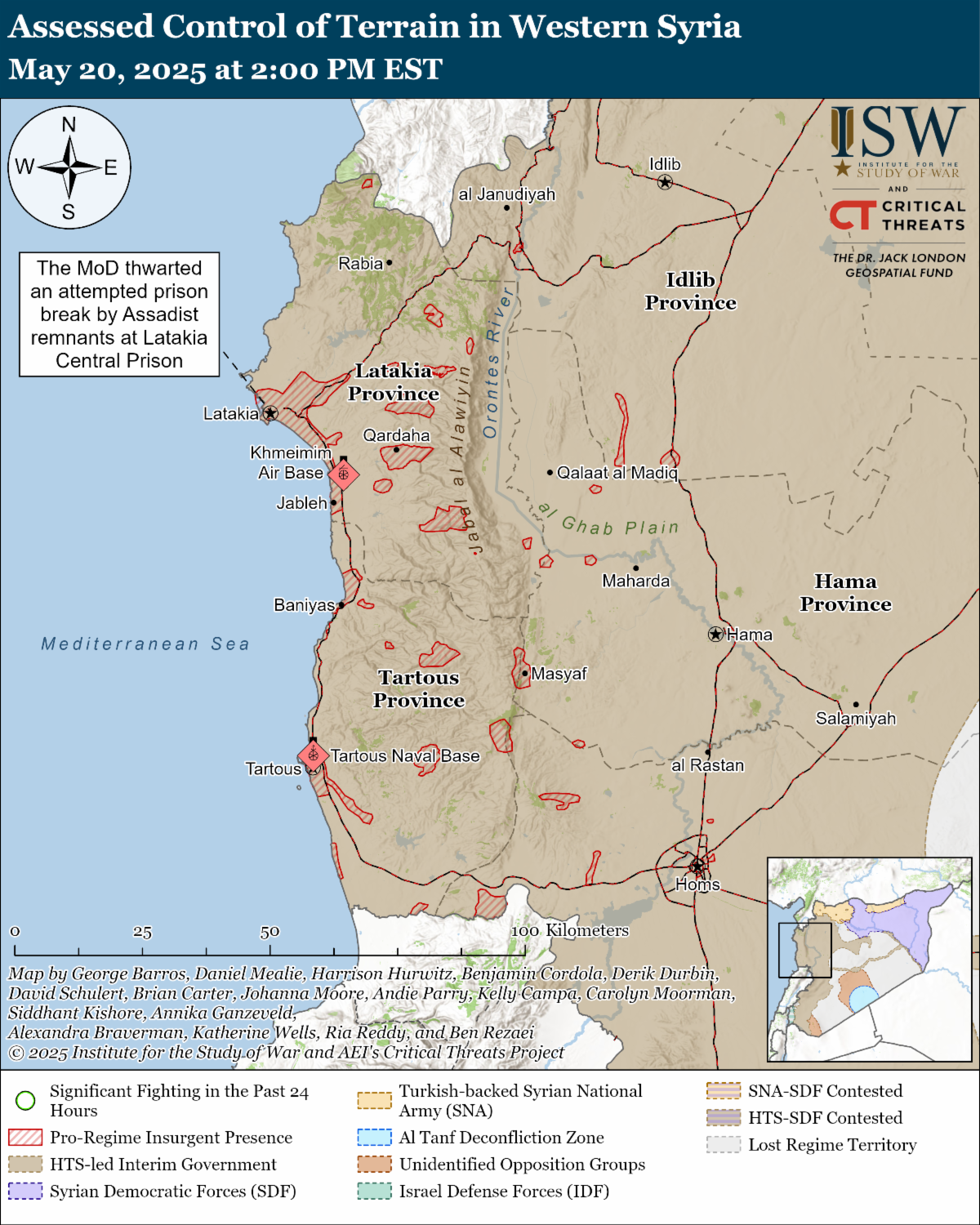주요 내용 요약
- 미국-이란 핵 협상: 이란 최고 지도자 알리 하메네이는 미국-이란 핵 협상에 대해 비관적인 입장을 표명하고, 미국의 우라늄 농축 제로 요구를 명시적으로 거부했습니다. 하메네이의 발언은 CTP-ISW의 평가와 일치하며, 이란과 미국 간의 우라늄 농축 제로 문제에 대한 이견이 협상을 교착 상태에 빠뜨리거나 합의를 지연시킬 수 있음을 시사합니다. 하메네이는 핵 협상에 대한 대중의 기대를 낮추어, 합의와 즉각적인 경제적 구제에 대한 기대를 줄이려 했을 수 있습니다.
- 잠재적인 미국 또는 이스라엘 공격에 대한 이란의 준비: 이란 수동 방어 기구 최고 위원회는 5월 20일에 회의를 열어 잠재적인 미국 또는 이스라엘의 공격에 대비하여 핵심 기반 시설을 보호하기 위한 준비를 조율했을 가능성이 큽니다. 수동 방어 기구는 군사, 화학, 사이버 또는 경제적 위협으로부터 민간, 군사 및 핵 기반 시설을 보호하기 위한 활동을 계획, 조정 및 지시하는 정부 기관입니다. 특히, 모흐센 파크네자드 석유 장관도 이 회의에 참석하여 이란이 자국 에너지 기반 시설에 대한 잠재적인 공격을 우려하고 있음을 시사합니다.
- 이스라엘에 대한 후티의 공격: 후티는 5월 19일, 예멘 내 후티 통제 항구에 대한 최근 이스라엘의 공습에 대한 보복으로 이스라엘 하이파 항구를 공격하겠다고 발표했습니다. 하이파 항구에 대한 공격은 후티의 10월 7일 전쟁 목표인 이스라엘 경제 고립을 지원할 것입니다. 후티는 미국-후티 휴전 조건에 따라 이 경제 봉쇄를 시행하려 합니다.
- 코카서스 지역에서 이란의 전략: 이란은 아르메니아와의 고위급 국방 협력을 심화시키고 있으며, 이는 남부 코카서스 지역에서 이스라엘, 터키 및 서방의 영향력에 대응하기 위한 광범위한 전략의 일환일 가능성이 높습니다. 이란 국방군 물자 지원부 아지즈 나시르자데 준장은 5월 20일 아르메니아 예레반에서 수렌 파피키안 아르메니아 국방부 장관과 만났습니다. 이란 국방부는 무기 해외 판매 및 국방 협정을 담당합니다. 이란은 역사적으로 아르메니아와 긴밀한 관계를 유지해 왔으며, 최근 몇 년 동안 아르메니아에 안보 지원을 제공한 것으로 알려졌습니다. 예를 들어, 2023년 7월 이스라엘 언론은 아르메니아가 아제르바이잔과의 분쟁에서 이란의 샤헤드 드론을 사용했다고 보도했습니다. 이란은 동시에 아제르바이잔과 군사, 정치 및 경제적 관계를 유지하여 남부 코카서스 지역의 외부 영향력에 대응하고 있습니다. 5월 17일, 이슬람 혁명 수비대 (IRGC) 지상군 미르자 쿠차크 칸 특수부대 여단과 아제르바이잔 특수부대는 이란-아제르바이잔 국경에서 합동 훈련을 시작했습니다.
- 시리아 제재 완화: 유럽 연합(EU)과 미국의 시리아에 대한 경제 제재 해제 계획은 시리아 경제를 안정시키는 데 도움이 되겠지만, 시리아 내 다른 불안정 요인에는 대처하지 못할 것입니다. 제재 완화는 다른 요인으로 인한 시리아 내 내부 갈등 재발의 가능성을 배제하지 않습니다. EU와 미국은 시리아 정부가 보안 기관의 극단적 요소를 제어하도록 장려하기 위해 개별 제재를 계속 부과할 수 있습니다. 표적 제재는 소수 집단이 자치 사회에 대한 극단적 요소의 학대에 대해 우려하는 사항을 완화할 수 있습니다.
분류: 국제 정치, 중동, 핵 협상, 군사, 외교
관련 주요 국가: 미국, 이란, 이스라엘, 아르메니아, 아제르바이잔, 시리아
향후 전망:
- 미국-이란 핵 협상은 교착 상태에 빠지거나 지연될 가능성이 높으며, 이는 중동 지역의 긴장을 고조시킬 수 있습니다.
- 이란의 군사적 준비는 지역 내 잠재적 충돌의 위험을 높일 수 있습니다.
- 후티의 이스라엘 공격 위협은 지역 경제에 영향을 미칠 수 있으며, 휴전 조건에 대한 도전으로 이어질 수 있습니다.
- 이란의 코카서스 지역에서의 영향력 확대는 지역 내 세력 균형에 변화를 가져올 수 있습니다.
- 시리아 제재 완화는 제한적인 경제적 안정만을 가져올 수 있으며, 내부 갈등의 위험은 여전히 존재합니다.
[원문]
| ||||||||||||||||||||||||||||||||||||||
| ||||||||||||||||||||||||||||||||||||||
|





 [국방부] 한-미, 6·25전쟁 전사·실종자 유해 공동발굴…"돌아올 때...
[국방부] 한-미, 6·25전쟁 전사·실종자 유해 공동발굴…"돌아올 때...
 [국방부] 국유단-미 국방부 전쟁포로·실종자 확인국, 6·25전사자 ...
[국방부] 국유단-미 국방부 전쟁포로·실종자 확인국, 6·25전사자 ...